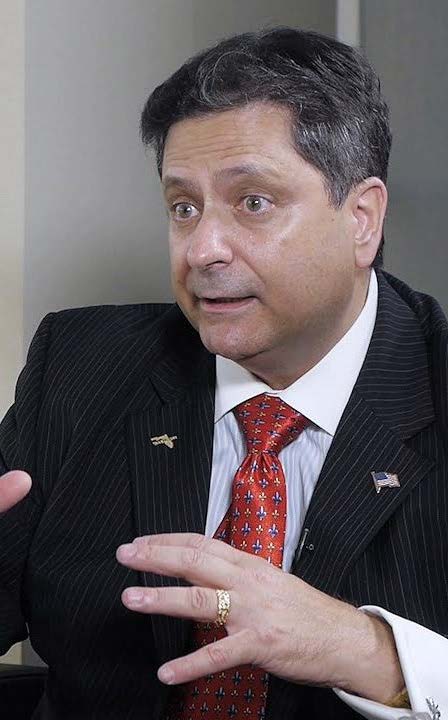
Bundling creates debate over amendment choices

Dominic Calabro
By St. Clair Murraine
Outlook staff writer
An amendment to ban greyhound racing and another that would restore ex-felons’ right to vote have become political issues for candidates in this year’s election. But while those are just two of a whopping 13 proposed constitutional changes that will be on the ballot, six of them could create some confusion for voters.
The Constitutional Revision Commission said bundling – giving voters more than one choice in an amendment was the best way to avoid having 25 or more questions for voters. However, even with the list dwindled, the CRC has been getting plenty of pushback for putting issues that have nothing in common in one amendment.
Take for example Amendment 7, which requires payment of death benefits for first responders and military members killed while doing official duty. That is tied to a proposal to establish a governance system for 28 state community colleges in addition to requiring a supermajority vote by university boards of trustees and the Board of Governors in order to raise college fees.
Florida TaxWatch has a specific interest in the first two amendments that have to do with property taxes, but the bundling issue also is a concern. Especially because voters could favor half of the bundled issue but has to vote for everything in the amendment.
“Voters and taxpayers are better served when they get to vote on an issue in of itself,” said Dominic Calabro, president of Florida TaxWatch. “Many of the items they have bundled together are not of a structural nature. It’s always better for people to vote up or down on an issue that they like or dislike.
“It (bundling) tends to cloud things when they are particularly not related. It’s compounded when they become controversial issues. Bundling is generally not good for accountability, transparency purposes; forcing people to accept something they don’t like for something they do like.”
Calabro suggested that some of the questions in the amendments could have been left to the state legislature. The first two amendments are examples of issues that the legislature could have settled, he said.
“It’s a good idea, but does it need to be in the constitution? No,” he said. “I think people will support it but it doesn’t need to be in the constitution.”
Bundling isn’t the only issue that supporters or opponents have with some of the questions. The wording has become such an issue that two of the biggest ones – banning greyhound racing, and Amendment 8 have been challenged in court.
Amendment 8 puts three questions to voters. It requires the establishment of school board term limits and allows the state to operate non-board established schools, and requires civic literacy in public education.
Several state newspapers’ editorial boards have called out the CRC over many of the revision suggestions on the ballot.
Brecht Heuchan, Chairman, CRC Style & Drafting Committee, has responded in an open letter. In it, he said grouping benefits voters and creates transformational ideas. He also said that state election officials have found that long ballots disincentive voters.
“Grouping some ideas together keeps the ballot from becoming too lengthy to complete,” Heuchan said in his letter. “If all of the CRC proposals were left as single amendments, there would be twenty-five questions on the ballot instead of 13; and in some areas of our state, each of those measures would be translated into multiple languages.”
The concept of grouping amendments isn’t new, however, this will be the first time that amendments will have to be approved by at least 60 percent of voters. In 2006, it made the change from a majority vote to 60 percent.
AMENDMENTS ON BALLOT
Here is a list of the proposed amendments that will be on the Nov. 6 ballot:
1 — Increases the amount of a home’s value exempted from property tax
2 — Makes the cap on nonhomestead parcel assessment increases permanent
3 — Requires voter approval of casino gambling
4 — Restores the right to vote for most people with prior felony convictions upon completion of their sentences
5 — Requires 2/3 vote of legislature to impose or increase tax or fee
6 — Adds a Marsy’s Law to state constitution, increases judicial retirement age to 75, and prohibits judges from deferring to administrative agencies in interpreting law
7– Requires death benefits for first responders and military members, a supermajority vote for college fees, and adds state college system structure to constitution
8 — Establishes school board term limits, allows state to operate non-board established schools, and requires civic literacy in public education
9 — Bans offshore oil and gas drilling and vaping in enclosed indoor workplaces
10 — Prohibits counties from abolishing certain local offices, changes start date of legislative sessions, and adds an executive office and executive department to constitution
11 — Repeals the following: (a) a prohibition against aliens owning property, (b) a requirement for a high-speed ground transportation system, and (c) a provision saying that changes to a criminal statute are not retroactive
12 — Prohibits public officials from lobbying for compensation while in office and six years thereafter
13 — Prohibits betting on dog races







